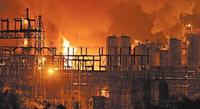-
Fate of chemical security bill uncertain

Late last month the House Energy and Commerce Committee approved legislation to extend federal regulations designed to keep chemical plants safe from terrorist attacks, but the bill’s ultimate passage is far from guaranteed; the bill that was recently passed is one of two competing House proposal — the proposals each envisions a different congressional panel monitoring chemical plant safety — and it is unclear which will make it to the floor for debate; in addition, many Democrats and some northeastern Republicans want the extension of the bill to be tied to toughening its language; further to examine what DHS is doing to secure the U.S. chemical facilities from terrorist attack, ASIS is hosting a panel on the Chemical Facility Anti-Terrorism Standards (CFATS) at ASIS annual conference in Orlando, Florida
-
-
Larry Summers calls for $100 billion in infrastructure spending
A former chief White House economic advisor is urging lawmakers to approve $100 billion in additional infrastructure spending to help boost the economy and prevent stagnation; Larry Summers, the former director of the White House National Economic Council for President Obama, wrote that it would be “premature” to limit fiscal support for the economy at the end of 2011
-
-
Truckers push for more highway spending
Last month truckers pushed Congress to increase investments to America’s highway system noting that cargo shipped by trucks was expected to increase sharply over the next decade; the American Trucking Association (ATA) recently predicted that by 2022, there will be an overall increase of 24 percent in freight transportation; of that 24 percent, the trucking industry will see its cargo load increase by 70 percent.
-
-
Massachusetts firefighters purchase chemical fire equipment
Local firefighters in Massachusetts recently received a new foam trailer capable of pumping out 500 gallons per minute; to control chemical fires and other difficult blazes, firefighters often use foam to coat the fuel to deprive the fire of oxygen; the new foam trailer is particularly useful as Ayer is home to several chemical and electrical facilities
-
-
Boulder Colorado hit with plague and rabies
On 3 June, the Boulder County Public Health (BCPH) department warned residents of the Mapleton Hill area that a domestic cat and a dead squirrel had tested positive for the plague; according to Joe Malinowski, the manager of BCPH’s Environmental Health Division, last week a second dead squirrel was found with the plague, but the cat had been successfully treated for the disease; so far there have been no other confirmed cases, but residents have reported several additional dead squirrels
-
-
House representatives battle for control of TSA
Representatives Pete King (R-New York) and John Mica (R-Florida) are battling for control over jurisdiction of the Transportation Security Administration (TSA); currently, King’s Homeland Security Committee oversees TSA as airport security checkpoints are manned by DHS employees — making TSA the only government transportation agency that Mica’s Transportation and Infrastructure Committee does not have jurisdiction over; last week Mica introduced an amendment that could place TSA under his committee’s control by moving to require TSA to hire private contractors to conduct airport screenings, thus removing DHS from the equation — and from King’s jurisdiction
-
-
Massachusetts defies feds, rejects Secure Communities

Massachusetts has become the latest state to reject DHS’s Secure Communities program; the state announced it would not sign a memorandum of understanding to participate in the DHS program; Massachusetts is the fourth state to reject Secure Communities in recent weeks; New York, California, and Illinois have all made efforts to reject the program as well; a DHS official said the federal government will force Massachusetts to join the program and that the state has no jurisdiction to opt out
-
-
Scientific research, budget cuts, and DHS
The FY2011 budget of DHS’s Science & Technology Directorate (S&T) is $827 million; this year the administration’s budget proposal raised it to $1.2 billion; a measure passed by the House last week cut S&T’s FY2012 budget by 52 percent relative to the current budget — to $398 million; DHS said the cuts would stall development of technologies for border protection, detection of bio-hazards, cargo screening, and seriously disrupt research into domestic IED detection, leaving mass transit vulnerable to attacks; as we consider this dramatic cut, we should accept three things: first, the growing national debt is a threat to the well being of the United States and its security, and must be addressed; there are only two ways to address the debt issue: the government must reduce spending, or it must take in more money, or both; second, every government program must be thoroughly examined to see whether there is a justification to continue it — or continue it at the current level of funding; homeland security programs should not be exempt from such an examination; third, reasonable men and women may differ on the relevant issues: what is the nature of the homeland security threats the United States is facing; what are the best — and most cost effective — ways to meet these threats; can every last research initiative at S&T be convincingly justified?
-
-
DHS reduces monitoring of non-Islamic domestic terrorism

In May 2009, DHS issues a report saying that the recession and Obama’s election could lead to a “violent radicalization” of extremist groups in the United States; conservative politicians and commentators charged that the report was an attack on conservative ideology and groups opposing abortion and immigration; in response, DHS has eviscerated the analytical unit which issued the report, cut the number of personnel studying domestic terrorism unrelated to Islam, canceled state and local law enforcement briefings, held up dissemination of nearly a dozen reports on extremist groups, and has blocked the dissemination of a digest of domestic terror incidents and the distribution of definitions for terms such as “white supremacist” and “Christian Identity”; state and local law enforcement and security experts are worried
-
-
Sheriffs in Pasco County, Florida to stop crimes before they happen

Local law enforcement officials in Florida are taking a new more proactive approach to fighting crime; last week Pasco County Sheriff Chris Nocco announced that the department would begin implementing what he calls “intelligence-led policing”; under his plan, officers will focus on gathering intelligence and sharing that information with local, state, and federal agencies to stop crimes before they occur; according to Sheriff Nocco 6 percent of offenders commit 60 percent of crimes, and so his department will begin more closely monitoring these individuals; Nocco has requested additional staff to help map crime patterns and share intelligence; critics of the approach are concerned about the notion that police officers are closely monitoring people who have not committed any crimes
-
-
Security Council to consider tough Syria condemnation
UN Security Councils considering harsh condemnation of Syria’s crackdown; draft resolution, advanced by Britain, France, Germany and Portugal, will likely run into a Russian, Chinese veto
-
-
Iran to enrich uranium to 20 percent
Iran said it was planning to begin enriching uranium to 20 percent, bringing its stock closer to bomb-grade level; it will also shift its enrichment activities from Natanz to Qom
-
-
Pakistan phases out U.S.-made border monitoring software
In 2002 the United States provide sixteen countries with a border-monitoring system called Personal Identification, Secure Comparison and Evaluation System (PISCES); Pakistan has now decided to replace the system with a Pakistani-developed system called Integrated Border Management System (IBMS); the government says the reason for the change is the IBMS is more capable, and denies the decision is the result of worries that the United States has access to PISCES-collected information
-
-
U.K. unveils new strategy to tackle extremism

The U.K. Home Secretary Theresa May yesterday unveiled the U.K. government’s revised strategy for tackling extremism; the new approach emphasizes preventing extremism at community levels; the new policy is the result of a review of the current policy, called Prevent, which was launched after the 7 July 2005 terrorist attacks on London transportation; the goal of Prevent was to stop the growth of home-grown terrorism by, among other things, supporting Muslim organizations which were considered moderate; the review found that many of these organizations took the money but did little, if anything, to counter extremism in the Muslim community; these organizations’ funding will now be cut; May said that terrorists must be tackled, but that any anti-terrorism programs “must also recognize and tackle the insidious impact of non-violent extremism, which can create an atmosphere conducive to terrorism and can popularize views which terrorists exploit”
-
-
Middlesex County, N.J. gets $1 million for mobile tent system
Local emergency responders in New Jersey recently received a big boost in disaster preparedness from DHS; last week the county unveiled a new 3,000 square foot mobile structure comprised of interlocking tents and trailers; the tents can be quickly set up to treat victims of a radiological accident, terrorist attack, pandemic, or weather emergency; the tent system can also be outfitted with its own water supply, power generator, and heating and cooling systems. They are even equipped with lights, showers, sinks, and a kitchen; for training purposes, the tents were set up at the Middlesex County College campus; the portable structure, called the Gatekeeper system, cost $1 million and was paid for with DHS grant money; county officials also received DHS grants to purchase mobile radiation detection devices for police officers; the tents and the radiation detectors come as part of a broader government effort to prepare local law enforcement agencies within a forty-five mile radius of New York City for a dirty-bomb attack
-
More headlines
The long view
Factories First: Winning the Drone War Before It Starts
Wars are won by factories before they are won on the battlefield,Martin C. Feldmann writes, noting that the United States lacks the manufacturing depth for the coming drone age. Rectifying this situation “will take far more than procurement tweaks,” Feldmann writes. “It demands a national-level, wartime-scale industrial mobilization.”
No Nation Is an Island: The Dangers of Modern U.S. Isolationism
The resurgence of isolationist sentiment in American politics is understandable but misguided. While the desire to refocus on domestic renewal is justified, retreating from the world will not bring the security, prosperity, or sovereignty that its proponents promise. On the contrary, it invites instability, diminishes U.S. influence, and erodes the democratic order the U.S. helped forge.
Fragmented by Design: USAID’s Dismantling and the Future of American Foreign Aid
The Trump administration launched an aggressive restructuring of U.S. foreign aid, effectively dismantling the United States Agency for International Development (USAID). The humanitarian and geopolitical fallout of the demise of USAID includes shuttered clinics, destroyed food aid, and China’s growing influence in the global south. This new era of American soft power will determine how, and whether, the U.S. continues to lead in global development.
Water Wars: A Historic Agreement Between Mexico and US Is Ramping Up Border Tension
As climate change drives rising temperatures and changes in rainfall, Mexico and the US are in the middle of a conflict over water, putting an additional strain on their relationship. Partly due to constant droughts, Mexico has struggled to maintain its water deliveries for much of the last 25 years, deliveries to which it is obligated by a 1944 water-sharing agreement between the two countries.
How Disastrous Was the Trump-Putin Meeting?
In Alaska, Trump got played by Putin. Therefore, Steven Pifer writes, the European leaders and Zelensky have to “diplomatically offer suggestions to walk Trump back from a position that he does not appear to understand would be bad for Ukraine, bad for Europe, and bad for American interests. And they have to do so without setting off an explosion that could disrupt U.S.-Ukrainian and U.S.-European relations—all to the delight of Putin and the Kremlin.”
How Male Grievance Fuels Radicalization and Extremist Violence
Social extremism is evolving in reach and form. While traditional racial supremacy ideologies remain, contemporary movements are now often fueled by something more personal and emotionally resonant: male grievance.
